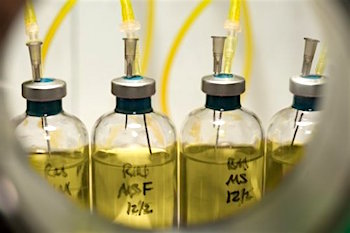 Researchers at the University of Arkansas recently took a step toward answering a question for the ages: Is there life on Mars? Answer: they can’t rule it out.
Researchers at the University of Arkansas recently took a step toward answering a question for the ages: Is there life on Mars? Answer: they can’t rule it out.
Two recent publications suggest that life, in the form of ancient, simple organisms called methanogens, could survive the harsh conditions found near the surface of Mars, and deep in its soils. Using methanogens to test for survivability is particularly relevant because scientists have detected their byproduct, methane, in the Martian atmosphere. On Earth, methane is strongly associated with organic matter, though there are non-organic sources of the gas, including volcanic eruptions. (…)
“We consider methanogens ideal candidates for possible life on Mars because they are anaerobic, and non-photosynthetic, meaning that they could exist in the subsurface,” said Rebecca Mickol, a Ph.D. candidate at the Arkansas Center for Space and Planetary Science.“Just a few millimeters of Martian regolith is enough to protect the organisms from the dangerous UV and cosmic radiation that hits the surface. Additionally, methane has been detected in the Martian atmosphere, via multiple space-based and ground-based sources, including the Martian rover, Curiosity. Although these findings are still controversial, the presence of methane on Mars is particularly exciting because most methane on Earth is biological in origin.”
Mickol is the lead author on a study titled “Low Pressure Tolerance by Methanogens in an Aqueous Environment: Implications for Subsurface Life on Mars,” published in September in the journal Origins of Life and Evolution of Biospheres. (…)
Pradeep Kumar, an assistant professor in the Physics Department, is looking at the implications for life deeper on Mars: as far down as 30 kilometers — more than 18 miles — under the planet’s surface. (…) On Earth, methanogens that survive in hydrothermal environments do so despite a wide range of pressures, pH levels and temperatures. (…)
The results, published in February the journal Planetary and Space Science, show that the methanogen M. wolfeii, one [of] the species Mickol experimented with, survived all pressure and pH levels. In acidic conditions, its growth rate increased with higher pressures. In neutral and alkaline conditions, the growth rate increased initially, then decreased with higher pressures.
“Given the discovery of methane in Martian atmosphere, our study raises an exciting possibility of methanogenic archaea to be a viable organism that can survive and possibly thrive in the subsurface conditions of Mars,” Kumar said. [More at links]








